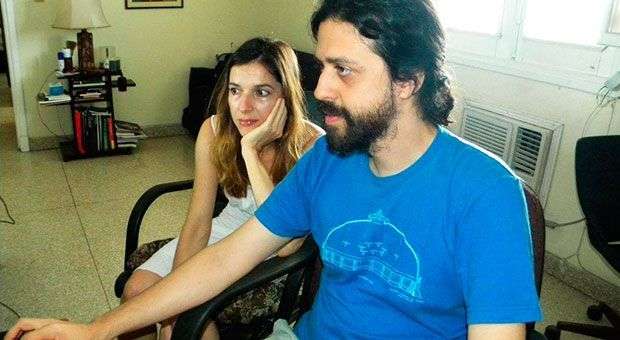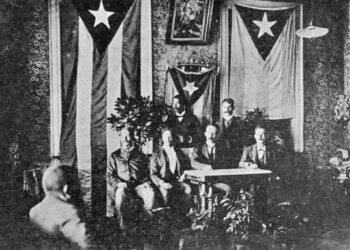Filmmaker Miguel Coyula just published his first novel Mar rojo, mal azul (Red sea, blue evil). He has different talents: he writes, edits, shoots, writes music, and draws like few people do every shot of his films. He is autonomous, versatile, multitask; he is some sort of man from the renaissance like some people call him. For his second film Memorias del desarrollo (Memories of development) he received about 20 international awards though he acknowledges that his greatest recognition is that the audience understands his piece and interprets it their own way. The book, launched just a few days ago at the Spanish Cultural Center in Miami, compliments a science fiction trilogy he had initiated in 2004 with Cucarachas rojas (Red cockroaches), his first full-length film and ends with Corazon azul (Blue heart), a film still in production. Coyula froze his youth and the experiences of his friends in this book he wrote in 1999, which also includes some of his drawings at that time. It seems that he gets bored of resting, he travels everywhere with his camera like an image hunter, a gift he portrays in his texts where every sentence is a shot and every paragraph is a sequence.
He talked with OnCuba about his novel though it was inevitable not to talk about movies:
Are you a filmmaker that writes novels or a writer that makes films?
Before I had a video camera, by the mid 90’s, I used to write stories and draw comics in my school notebook. As I didn’t have the tools to make films yet I tried to write the closest to the cinematographic industry to simulate its language and achieve a sensorial emotion, something I considered very important. I created images, colors, feelings and emotions in every page I wrote. This book is written differently from how I would do it today, I was only 22 years old. My objective was above all to make the most of the impression the story could cause. This is a very unpleasant novel, it is about chaos.
Chaos, the apocalypse, and the constant alternative or reinvented reality are common topics in the book. How are they manifested in the novel?
Mar rojo (Red sea)… depicts an alternative Cuba where ideas have been left behind; it exposes a future of acid rain and genetic manipulation. It narrates the interesting story of an individual that has got used to living in a society without ideologies and starts to feel nostalgic for what he had never experienced and for all he had lost. Then, he opens his eyes and the world starts to crumble upon him.
What do you mean by that title?
Blue and red are two opposite colors that refer to the deep feelings of the novel that deals with right and wrong, innocence and nostalgia, passion and destruction.
What differentiates this story from the other novels of the science fiction trilogy?
It is really interesting because it has autobiographic elements. Every character is a friend from pre university school; I imagined them in an alternative reality maintaining their respective conflicts and personalities. I changed some last names and names. It is mostly narrated in third person; it experiments with language and sometimes gets in the head of some characters. My alter ego takes part in the novel; it is a character that, though it is not the main character, it represents me and carries my name. Each chapter has a different structure. It separates completely from the Cuban contemporary reality unlike Corazon azul, which has some points in common with our contemporariness.
Are you thinking to turn this book into a movie?
Curiously when I wrote the book I had in mind to make it a script and then a movie. Today when I read it again I don’t see it anymore as a film. I wrote it a long time ago and it is an energy entirely different that the one that pushed me to write it back then. Today I wouldn’t have been able to write it like that, perhaps at some point I’ll think about turning it into an animated film.
What is it in science fiction that gets your attention?
As a child I used to watch science fiction movies. Japanese cartoons and other films created in me an alternative reality that fascinates me. I have always been trying to escape from reality by creating an alternative. But most of all it is the possibility to create an imaginary universe that somehow tackles real issues which takes me to science fiction, in the cinema and in literature. I’m interested in creating a science fiction piece that deals with an alternative society that at the same time talks about the society we live in.The creation of a strange atmosphere that has more in common with the oneiric than with daily life, with this genre I get to explore feelings in dreams.
How do you manage to produce a film practically by yourself?
I started to do everything by myself out of need. Today I believe that although I can afford it I wouldn’t do it with anyone. I wouldn’t because I got used to do it like this. At the International Cinema and TV School of San Antonio de los Baños, from where I graduated, I went through difficult moments for my autonomous way of creation. Given that this school trains you for this industry; it forces you to work with several professionals, which was very hard for me because I used to argue a lot. It is difficult to ask someone to do something perfect and it is even more difficult when you don’t have the resources to pay him well; you turn him into a slave, which makes no sense at all. To me it is really important the exact millimeter of a frame, the exact photogram for editing, and it is hard to get someone else to do it. In a film everything is a matter of rhythm. It is a pleasure for me to make my movies by my own. It’s like building the film with my bare hands; it’s like gradually craving a sculpture.
Why is all your work independent?
Also because I had to. I’ve never presented any projects to the Cuban Films Institute (ICAIC by its acronym in Spanish) because I prefer to go out to the streets and shoot and improvise than to be guided by structured projects. The idea is to have the means and the freedom of a writer when he comes up with a thought and writes it down. That’s the kind of cinema I do and I prefer, but it is very difficult for any industry, no matter if it’s Hollywood or ICAIC. It is complex for them because I like to improvise a lot. That’s one of the advantages of making independent films because you have time to develop your ideas. When you are immersed in a project for a few years you come up with lots of good ideas that you cannot plan in a script, which is very interesting. In addition, I don’t make commercial films and therefore they are not for any kind of audience which is a risk for this industry. They either fit in festivals and European foundations that finance cinematographic projects because they have some sort of pre-established mold. They have a specific profile for minimalist social movies. My work doesn’t fit in any of these trends or profiles; therefore, independent production is the best alternative. I always say that when making independent movies you have to take advantage of the fact that you answer to no one and you can let flow your creativity. It is possible to make a great independent movie from Hollywood models or traditional forms, but I believe that the most important thing is to be independent of spirit. Independent cinema has to be awkward because that creates a reflection on the society we live in.
We can notice a bleak future for humanity. What’s your prospect for the Cuban cinema in the years to come?
I don’t have a crystal ball but I can tell you that 5th Avenue productions are developing a very interesting work because they have succeeded in gaining independence from the industry. Actually, it is not possible to talk about any movement in the current and perhaps future Cuban cinema because there is great diversity, which is good. I favor the difference of genres that didn’t exist in the Cuban cinema. It is important to count on a national cinema that trespasses geographic boundaries in substance and form. The Cuban cinema is a kind of cinema that focuses on the epidermal perhaps because living in the Cuban society is really difficult. This sometimes hinders the possibility to get away from reality in order to be able to look at art in the distance and do it universally, so that it can be understood all over the world.
What’s the main obstacle that your generation of filmmakers is facing today?
In my case the production is not as difficult as finding distribution. For every filmmaker the greatest goal is to exhibit their work beyond sharing them in pen drives. The pleasure of displaying them at the movies, because I believe in that, is unique. I shoot thinking in the big screen. Every detail I work on is thinking on the big screen and that goes for images, sound effects, etc. and to look at all that in the TV is frustrating. It is a shame that it happens so often.
Do you think this might change with a cinema law?
I don’t know. Something should change with a law. I think it is ok, but that’s not vital for me. I don’t lose my time on meetings about this, I devote my time to making films and that takes all my time. However, what I’m really concerned about is that if the whole cinematographic production is legalized, taxes will emerge. That would be a terrible consequence for producers like me, because I make movies for my personal satisfaction and not precisely to make profits. Teaching iswhat supports me economically. I live for the cinema, but not from it.










